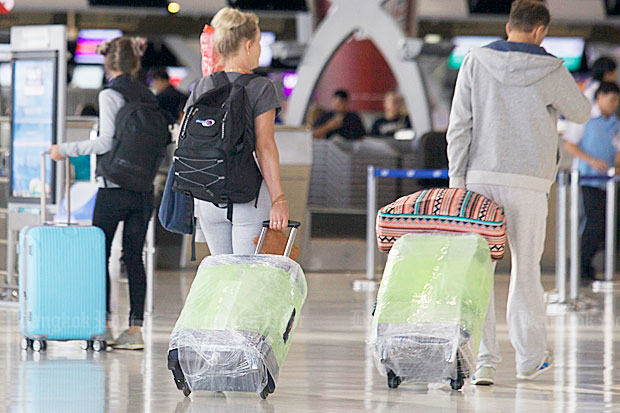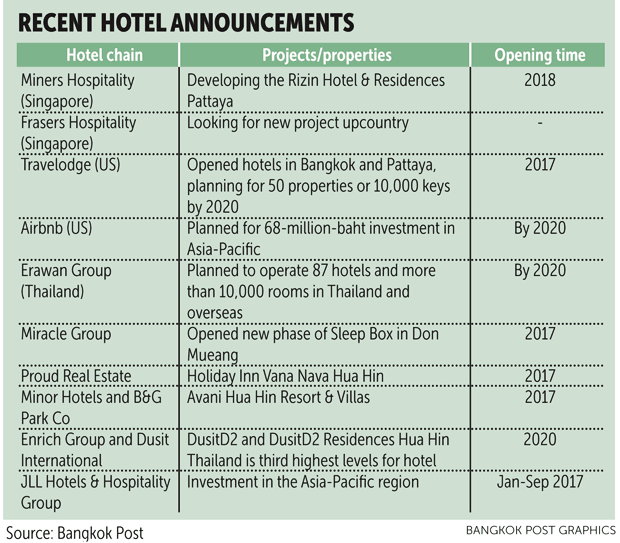
Strong tourism growth is boosting foreign and local hotel chains as they expand their portfolios to capitalise on greater numbers of international visitors, giving Thailand some of the highest hotel investment in Asia-Pacific during the first nine months of 2017.
The country welcomed 26.1 million international arrivals in the January to September period, up 5.4% from the same period in 2016. Tourism officials aim for 34 million visitors and 1.81 trillion baht in tourist spending this year.
Looking ahead, the government has introduced a national tourism campaign for the coming year called "Amazing Thailand Tourism 2018" that will focus on unique local products. The move is aimed at promoting the country as a preferred destination in the long term, and hotel chains are preparing to meet demand.

Singaporean company eyes market
Mendes Cavin, founder and chief executive of Singapore-based Miners Hospitality, said it just announced a project in Pattaya, along with the recent appointments of two new senior executives to handle the company's anticipated growth in 2018.
The new development, The Rizin Hotel & Residences, will be the fifth project for Miners Hospitality in Pattaya alone. The company has been successful in developing properties in China, Sri Lanka, Nepal, Thailand and Indonesia.
The Rizin Pattaya is scheduled to open in March 2018, while S Loft Manado in Indonesia is the latest property to be developed by Miners Hospitality and will be ready to open in February 2018.
Another chain from Singapore, Frasers Hospitality, a division of Frasers Centrepoint Ltd, launched the Modena brand in Thailand in 2016. The 238-unit property is set to serve international guests, both leisure and business travellers.
Modena by Fraser Bangkok offers rates in the range of 2,200-4,500 baht per night. The hotel has an occupancy rate of 70% and hopes to climb to 80% during peak season. The top five markets for the hotel are China, Singapore, Malaysia, Japan and Thailand.
Modena brand was launched in 2010 and made its debut in Shanghai. The group is eyeing the launch of more projects in Thailand's provinces, with Buri Ram most likely to be the next location.
American brand comes back
The American hotel chain Travelodge used to manage four Travelodge hotels in Thailand during 1989-2000 before ending management due to changes in hotel ownership and management deals. Of the four hotels, two were in Phuket, one in Krabi and one in Bangkok.
The group has returned to the Thai market with Travelodge Pattaya, with 168 rooms, launched in July this year, consistently running occupancy levels of 80-90%. Travelodge Sukhumvit 11, with 224 rooms, opened in early November and runs an average occupancy rate of mid-80%.
Jonathan Wigley, chief executive of Travelodge Thailand, said the group aims to have a minimum of 15 properties or 3,000 rooms by the end of 2018 and 50 properties or 10,000 rooms by 2020. Targeted areas include Chiang Rai, Chiang Mai, Khon Kaen, Hua Hin, Rayong, Phuket, Khao Lak, Koh Samui, Krabi and more in Bangkok, Pattaya (Jomtien) and other destinations.
Nevertheless, San Francisco-based Airbnb recently announced it would invest 68 million baht to support sustainable, inclusive tourism projects in the Asia-Pacific region until 2020. The company said its vision is to empower hospitality entrepreneurs across the region.
Destination marketing organisations, non-governmental organisations, non-profit agencies and community social groups will be given the opportunity to access financial assistance for innovative tourism projects.
New data shows that the Airbnb community generated 952 billion baht in Asia-Pacific economies and contributed to 370,000 jobs across 116 cities throughout the region in 2016. In terms of international travellers in 2016, Airbnb accounted for at least 5% of all arrivals in six Asia-Pacific countries.
Local chain expands further
The latest announcement made by Erawan Group Plc said the company expects to run 52 properties with 7,238 rooms this year, up from 41 hotels of 6,385 rooms last year. The number of hotels is set to increase to 87, with over 10,000 rooms. Of the portfolio, 25 properties will be luxury and midscale hotels and the rest will be Hop Inns -- the group's budget segment.
Next year, Erawan Group will open Novotel and Ibis Style Nana and expand Hop Inn in Thailand as well as in the Philippines. In 2019, Mercure and Ibis Sukhumvit are due to open along with more Hop Inns in Thailand and the Philippines.
By 2020, the group expects to have 25 luxury and midscale hotels, 50 Hop Inns in Thailand and 12 Hop Inns in the Philippines.
The group is also renovating the JW Marriott in Bangkok, which is set to conclude in 2019. Moreover, it is adding 13 deluxe rooms at the Naka Island, A Luxury Collection Resort and Spa Phuket.
Meanwhile, Aswin Ingkakul, president of Miracle Group, said the second phase of Sleep Box Hotel by Miracle at Don Mueang airport has opened. The group invested over 60 million baht for the new edition of Sleep Box, which covers 750 square metres. This is a response to the 7.8% increase in the number of travellers to Don Mueang, which hit 37 million this year.
The first Sleep Box by Miracle was launched in 2016, and this new expansion adds 35 more rooms to the previous 25. Room rates for the first hour are 500 baht, 300 baht for each subsequent hour and 2,500 baht for an overnight stay including breakfast.
Proud Real Estate Co recently launched Holiday Inn Vana Nava Hua Hin, worth 1.8 billion baht, aiming to cope with growing tourism in the west coast of Thailand. The hotel features 300 rooms in a 140-metre-high building, making it the tallest building in Hua Hin. It also features one of the largest facilities for meetings, incentives, conventions and exhibitions (Mice) in this resort town.
Minor Hotels announced a 50-50 joint partnership with B&G Park Co to own and operate a resort in the beachside town of Hua Hin, Ananda Hua Hin Resort & Spa. The property is set to get rebranded as Avani Hua Hin Resort & Villas this week.
Minor Hotels has invested about US$22.5 million (737 million baht) in the project. The resort offers 196 guest rooms and a 900-sq-m ballroom, the largest event space in Hua Hin. The meeting facilities will allow this resort to handle Mice events.
Enrich Group has inked an agreement with Dusit International and Plus Property Co to operate its mixed-use project set to be built in Hua Hin next year. The project will have 150 hotel rooms and 364 residence units. Dusit International is set to manage the hotel, to be called DusitD2 Hua Hin, while Plus Property will be the sales agent and manager for DusitD2 Residence Hua Hin.
Expected to open in the first quarter of 2020, DusitD2 hotel is valued at 620 million baht. Dusit will manage the hotel for five years, with an extension option of another five years. DusitD2 Residences Hua Hin will be valued at 820 million baht.
Thailand ranks third in investment
According to Mike Batchelor, head of investment sales for Asia at JLL Hotels & Hospitality Group, Hong Kong led Asia-Pacific by volume of hotel investment transactions, with 11 deals worth a total of nearly $1.5 billion in the year to September.
Japan and Thailand saw the second- and third-highest levels of activity across the region at $1.2 billion and $335 million in transaction volume, respectively.
Thailand has experienced another active year in hotel transactions, led by Bangkok. The $335 million is the highest total volume recorded since 2014. JLL acted as sole adviser on several hotel deals this year, including the Premier Inn portfolio and Sukhumvit S27, selling for a combined $111.5 million. Interest in Thailand is being buoyed by continued political stability and the relative affordability of hotels compared with a number of other Asian countries.
Meanwhile, Savills Group reported its third quarter for Asia-Pacific hotel sales and investment, indicating that Thailand-based buyers were the third-largest cross-border hospitality investors, after China and Singapore.
Chris Hobden, head of research for Thailand at Savills, said the total value of investment sales in the third quarter reached $4.77 billion, while the transaction volume recorded an increase of 55.2% compared with 2016.
By purchaser origin, China-based R&F properties was the single biggest purchaser in the third quarter. Excluding Chinese buyers, Singaporean buyers represented 28.1% of the rest of the investors, followed by Thailand and South Korea-based buyers at 16.7% and 15.8%, respectively. These buyers outperformed traditional purchasers from Hong Kong and Japan.
"Thailand's increasing regional hospitality investment follows a growing trend of Thai companies exploring international opportunities," Mr Hobden said. "With the baht having strengthened against regional currencies, coupled with a desire among prominent Thai groups to diversify their holdings, we expect Thai capital to become increasingly prominent across Asia-Pacific over 2018."